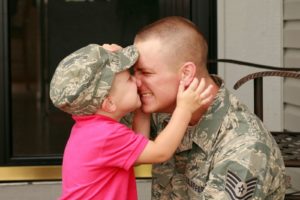Veterans Day is a time to step back and honor those who have served or are currently serving our country. It’s a day to reflect on how the service and sacrifice of others have paved the way for the freedoms and opportunities that we enjoy.
Today, I would like to take the opportunity to express my gratitude and admiration of the work you do and have done for my benefit. I would also like to step back, honor, and reflect on the service and sacrifice that each member of a military family makes or has made when a service member serves his or her country.
For military families, every extended work day, training, rotation, or deployment means there is a homefront parent or caregiver doing “boots on the ground” work of providing emotional support, childcare, discipline, and household management. Service members, homefront caregivers, and children all work hard to continually adapt to the ongoing changes and transitions that military life entails. Military families sacrifice the luxury of always being physically together on holidays, birthdays, first steps, family reunions, and soccer games in order to serve and protect the people of our country.
In Honor of Military-Connected Children: Answering the Tough Questions
While military children may not always directly ask, many wonder: “Why do (or did) you have to leave for so long?” or “Why do we have to move so much?” Even very young children who can’t effectively communicate these questions notice separations from their parents or caregivers and need to understand these experiences.
A large part of my job involves helping military families prepare for or reintegrate after a military-related transition or separation. In doing this work, I find that many families know that to best support their children through this stressful time, they must help them understand what is happening. But parents often wonder, “How are we supposed to do this?”
The saying “they don’t come with a manual” rings especially true for situations like this — situations that most Americans have the privilege of never having to go through. So, as I take this moment to show my support and gratitude to military families who do this work, I’d like to share some guidance for answering some of the tough questions about deployments and military service.
What Does Your Child Really Want and Need to Know?
When going through an extended separation from you, your children need to know who will take care of them, that each of their caregivers loves them, and that they will be protected and cared for throughout each separation or transition. Tell your children you are not leaving because of anything they did, thought, or said. Assure them that you don’t want to be separated from them.
Very young children need to hear these messages in very simple and concrete terms. They also need physical reassurance, such as hugs. Older children and adolescents may receive these messages most effectively through honest discussion and reassurance that you are still there to support them even though they are older.
Be direct and honest, even with young children, but be sure to use developmentally appropriate language and take pause if you think that a detail might be unnecessary or frightening.
What Do You Want Your Child to Know or Understand About Your Family’s Military Service?
Your family became a military family for a reason. Maybe it was a sense of patriotism, a passion for serving others, or a deeply held tradition in your family. Maybe it was a path for financial security or a better future for yourself and your family. Maybe it was a way to explore the world, learn new things, or gain an education. Whatever the reasons may be, these decisions often point to your underlying values.
You can help your children understand why you do what you do and why you make the sacrifices you make by passing down those values. Talk to your children about your values and reasons for being a military family. And, when talking with young children, remember to use simple and consistent messages. For example, “We are a military family so we can help people.”
For adolescents, you can provide information at a more sophisticated level. And allow time for them to share their own developing opinions and values. Think of this as an opportunity to guide and support your child.
Thank you, military families, for doing the tough work that you do. Because of you, we enjoy the lives and freedoms that we have. Today, we celebrate you.










